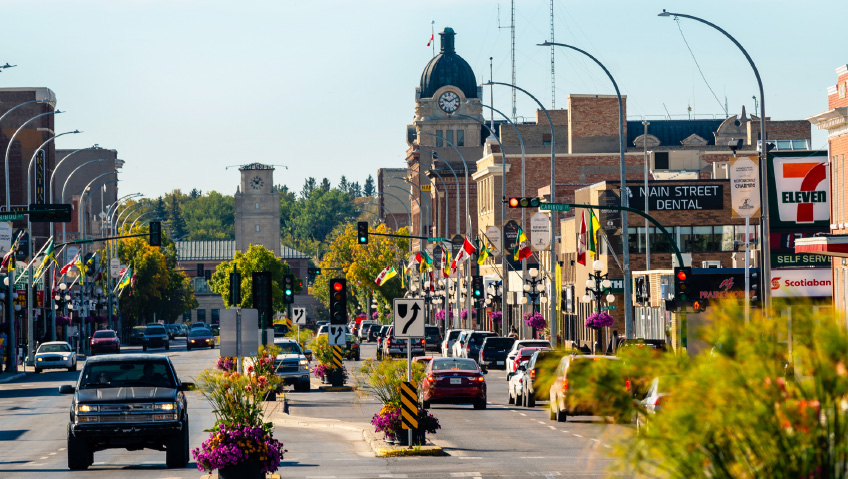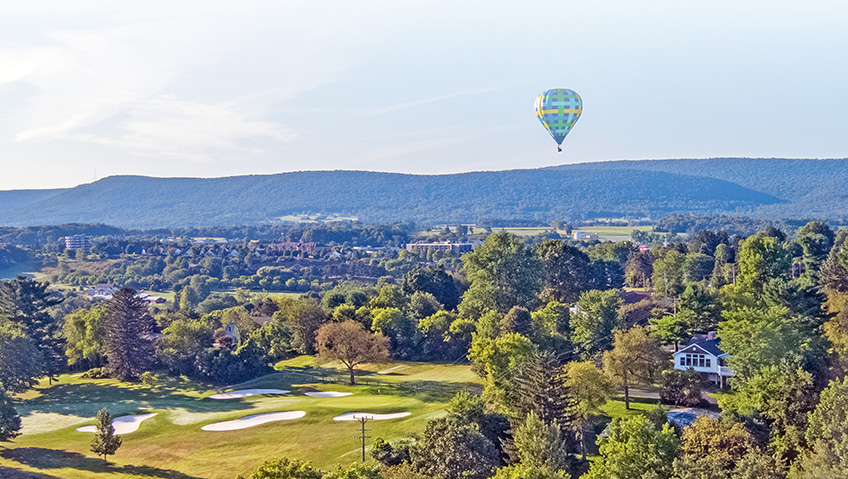The City of Moose Jaw is many things, but boring isn’t one of them. Known for years as the “Friendly City,” this home to over 35,000 became “Canada’s Most Notorious City” in 2020, a nod to the bootleggers who thrived during its fabled prohibition past and to legendary gangster Al Capone, who is believed to have used the city’s tunnels as a hideout during the Great Depression. However, the notoriety doesn’t end there, as Moose Jaw is home to world-famous icons like the Canadian Forces Snowbirds aerobatic team and Mac, the world’s tallest moose.
Today, this Southern Saskatchewan city is renowned for its #Notoriouslyoutstanding quality of life and is recognized as a great place to start or grow a business. Located just 68 kilometres from Regina on the Trans-Canada Highway, Moose Jaw is primed for growth across the agriculture, energy, aerospace, and tourism industries.
Moose Jaw is also getting used to the world coming for a visit, as the city played host to the 2023 World Men’s Para Hockey championships and is preparing for the 2025 BKT Tires World Men’s Curling Championships, March 29-April 6 at the Moose Jaw Events Centre, the 4,500-seat multi-purpose arena in the heart of Canada’s Most Notoriously Charming Downtown.
Business on the rise
Along with time-tested sectors including value-added food and livestock processing, petroleum and chemical refining, potash mining, energy production, and manufacturing, Saskatchewan’s fourth-largest city is working to become a leader in business retention and expansion.
“It is our goal to be active, meet the business community, and do a better job of listening so we can understand their challenges and successes, and identify any programs or support we can provide,” explains Craig Hemingway, Director of Strategic Growth, which encompasses economic development and communications. One of the city’s recent initiatives was funding a social media strategy program, a course for businesses to market themselves. “We are trying to identify more of those opportunities to provide value to our business community, and give them tools to promote themselves,” says Hemingway.
Previously serving as Moose Jaw’s Manager of Communications/Stakeholder Relations, Hemingway is well-acquainted with many of the city’s businesses and entrepreneurs and is aiming to further raise both Moose Jaw’s profile and awareness of the opportunities it offers.
Since coming on board in 2017, Hemingway has seen the city’s growth firsthand in virtually all areas, including food processing, retail, restaurants, recreation, attractions, government, and housing. New developments include North 49 Foods, a new sow processing facility and an expansion from Donald’s Fine Foods Group, which owns Thunder Creek Pork. The opening of a new facility in late 2023 represents a significant addition to Saskatchewan’s ag sector.
Along with food processing, Moose Jaw continues attracting investment from other industry sectors. This includes Brandt Industries. Providing a range of products for clients in agriculture, construction, forestry, mining, oil and gas, and more, this decades-old family-run business recently opened a trailer manufacturing plant in Moose Jaw.
“Moose Jaw was considered an ideal location, with its strong workforce and history as a centre for trailer production,” stated the company in a media release, adding: “Brandt is very excited to become an active member of the Moose Jaw business community and we will be hiring local contractors to prepare the facility for production.” The new facility will see up to 200 jobs created and local vendors employed for everything from supplies to janitorial services and snow removal.
Other prominent retailers, including Canadian Tire, have also chosen Moose Jaw and set up facilities along well-travelled Thatcher Drive, close to well-known stores including Rona, Winners, Staples, Loblaws, Real Canadian Superstore, Walmart, and Popeyes Louisiana Kitchen.
For years, Moose Jaw has remained popular with both new retailers and long-time businesses, like family-led Simpson Seeds Inc. This past June, the company officially broke ground on its new pulse processing facility. Slated to open this year, the facility will measure around 650 square metres and will enhance the company’s ability to produce more niche value-added products. Related to fourth-generation Simpson Farms, Simpson Seeds “has created a synergy that allows the farm to market all of their pedigree seed to local producers, and commercial grain to countries all around the world,” according to the company’s website.
“There is a lot happening, not just in Moose Jaw, but in the Moose Jaw-Regina industrial corridor,” Hemingway shares. Also in the works is the massive Future Aircrew Training (FAcT) expansion project at 15 Wing Moose Jaw. The project was finalized last year, and Moose Jaw is one of three airbases in Canada to be part of the FAcT program. With a contract value of $11.2 billion (including applicable taxes), the project represents a 25-year contract to train the Royal Canadian Air Force (RCAF), including pilots, air combat system officers, and airborne electronic sensor operators.
Procurement will also include related necessary services, such as aircraft and airfield maintenance, food services, and accommodations. “Once construction is underway, it will mean about 600 construction jobs,” says Hemingway. “We recently had an information session in Moose Jaw for local contractors to understand the procurement process and be involved in the project, which will result in new hangars, several runways, and other buildings. It is incredibly exciting.”
Another project in the works is a proposed Nitrogen Fertilizer Complex in Belle Plaine. The company behind the project, Genesis Fertilizers, is proposing the financing, design, and construction of “a new, highly efficient nitrogen fertilizer production and distribution system that serves today’s modern farmer,” says the company. Once these and other works are underway, there will be a tremendous need for construction workers, many of them local. Moose Jaw will see numerous economic spinoffs as a result of the Genesis project.
In the southeast quadrant of the city, the Moose Jaw Agri-Food Industrial Park encompasses over 700 acres of prime industrial land. Near a national railway and the Trans-Canada Highway, the Park is perfect for export of products east, west, and south to the United States. Near a wastewater treatment plant, effluent irrigation, and lagoons, it is well-suited to wet pea processing plants. According to the city, parcels can be tailored to different needs, such as manufacturing, research, greenhouses, or processing.
In a different vein, the city at one time discovered therapeutic mineral waters of around 45°C (113°F) while exploring for natural gas to produce electricity. The early 1930s saw this water used in a therapeutic mineral spa/swimming pool. In time, another well was drilled, and the Temple Gardens Hotel & Spa was opened in 1996.
Purchased by the Peepeekisis Cree Nation in late 2022, ambitious multi-million-dollar renovation plans were soon put in place. This will include the renovation of all 181 rooms, including new plumbing and heating, bathrooms, and even furnishings and carpeting. Working block-by-block, the goal is to have all renovations completed by the end of this year.
Energizing Moose Jaw
To ensure Saskatchewan residents, businesses, and industries have sufficient energy to power their needs today and into the future, SaskPower’s new 370-megawatt Great Plains Power Station officially went online in December. Announced in March 2021, the project saw a peak of over 600 workers on-site at the height of construction in July 2023, 70 percent of them from Saskatchewan, including 13 percent from Moose Jaw.
“Great Plains Power Station will provide the reliable and affordable power that Saskatchewan needs to keep growing,” stated Minister Responsible for SaskPower, Jeremy Harrison, in a statement. “Construction of the plant has already made significant contributions to the local and provincial economy, with more than 300 Saskatchewan companies contributing to this project for a total of $266.7 million in local participation and $48.9 million in Indigenous participation.”
A combined-cycle natural gas-fired station in the Moose Jaw Agri-Food Industrial Park, Great Plains will generate reliable baseload power as the province moves closer to increased energy efficiency and reliability and a cleaner, more sustainable energy future. “The construction phase of that was huge, and has brought another 25 full-time jobs to the city,” says Hemingway. There is also interest from Eaglesledge Energy (ELE) for a Clean-Tech Refinery and Solar Facility in nearby Belle Plaine. A privately held company, ELE is focused on developing petrochemical and renewable energy projects.
A great place to ‘get a life’
Recently, Moose Jaw was named one of Canada’s Most Livable Cities by The Globe and Mail. “We moved up 50 spots from 2023 to 2024, and are 76th out of 448,” says Hemingway. Back in 2022, the city launched its award-winning “Get a Life” campaign, which was designed for people not from Moose Jaw to think about moving to the city. In some separate rankings, Moose Jaw rose to 13th place in Canada to raise a family. “We are very pleased with the rankings, and feel it dovetails perfectly with our message, and we’ll continue to tell people they can Get a Life in Moose Jaw.” Hemingway often meets newcomers to Moose Jaw of all ages who moved to the city for its quality of life and many amenities.
Even locally, many people work in Regina but choose to live in Moose Jaw, where getting around is much easier and less stressful. “As the world changes, certainly that concept of even a 40-minute highway drive becomes less and less cumbersome, compared to being stuck in gridlock traffic for 40 minutes to an hour and only moving a few hundred feet, depending on the city,” says Hemingway.
To accommodate the anticipated growth, the city is pleased to see developers undertake some multi-unit construction. Housing starts were up considerably in 2024 compared to 2023: 33 housing starts versus 13 at the same time the previous year. This includes a brand-new residential subdivision, a school set to open in 2025, and 52 residential lots for sale. “While not perfect—and slightly challenging—we are in better shape than a few years ago,” says Hemingway.
The number of local hotel rooms is also on the rise. From around 700 hotel rooms six or seven years ago, the city now has 950 rooms to meet the needs of tourists, traveling students and athletes, and longer-stay construction workers.
“There is huge opportunity here, not just in the agriculture sector but also in the aerospace, tourism, and energy sectors,” says Hemingway. “In Moose Jaw, we are ready to grow. We’ve had the same population for decades, and just have the feeling with our new mayor and council that we are ready to go to the next level, grow our community, and be part of the success of southern Saskatchewan.”






